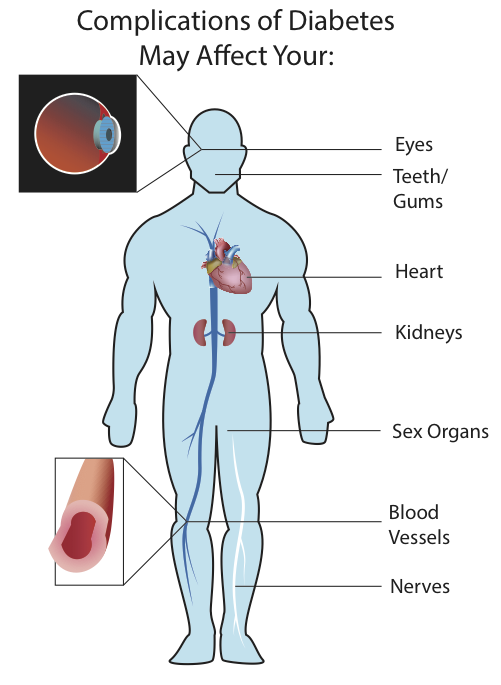Effects of Diabetes: What Does Diabetes Do To the Body?1
 The symptoms of diabetes are directly related to the effects of diabetes on your body. Both Type 1 Diabetes and Type 2 Diabetes damage the body in similar ways.
The symptoms of diabetes are directly related to the effects of diabetes on your body. Both Type 1 Diabetes and Type 2 Diabetes damage the body in similar ways.
Effects of Diabetes: Progressive Damage
The chronic symptoms of diabetes are related to the nerves, blood vessels, and organs that are damaged or destroyed by chronically elevated blood sugars. High blood sugars damage or destroy both small and large blood vessels, damage nerves, and suppress the immune system.
The destruction of large blood vessels, such as the coronary arteries, renal arteries, or arteries leading to the brain, can cause heart attack, stroke, and direct kidney damage or increased blood pressure.
The destruction of small blood vessels decreases blood flow to all of the organs in your body. With decreased blood flow, these organs receive progressively less of the essential oxygen that they need to function properly. The organs become damaged, and their function slowly decreases to the point where they eventually do not work at all. The organs where this is most prominently related to symptoms include the kidneys (decreased renal function), the eyes (decreased vision), and (most importantly to many of us) the penis (erectile dysfunction).
Diabetes and Blood Sugar
Nerves throughout the body are also affected both by chronically increased blood sugars and by decreased blood flow (yes, there are thousands of small blood vessels that supply nerves with essential blood flow). These nerves are eventually (sooner than you may think) damaged or destroyed resulting in loss of sensation and/or pain in extremities, decreased wound healing, and worsening of erectile dysfunction. It is important to realize the importance of decreased wound healing in diabetes. Diabetes is the leading cause of non-traumatic amputation in the United States.1
Finally, chronically high blood sugars suppress the body’s immune system. This, in turn, decreases the immune system’s ability to respond to external insults and threats. Diabetics are thus at increased risk for infection anywhere in the body. Additionally, diabetics have a much more difficult time fighting off infections that are already present.
EMG Health Homepage: Men’s Health Introduction




